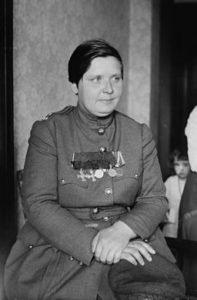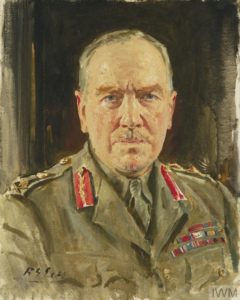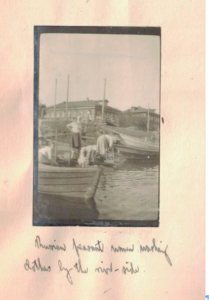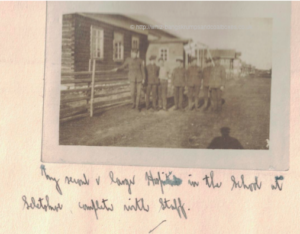Monthly Archives: September 2018
30th September 1918 Monday
Evacuating the Sick and Wounded and the Defence of Shenga
All material produced or reproduced here and throughout this work is the sole copyright of the author and the family of Doctor D.C.M. Page MC.
“On Monday 30th September I got four wounded and one sick man off to Archangel on a small river boat which McNair had sent up for me. It was an awful job getting the stretcher-cases aboard. We couldn’t get them down the hatchway into the cabin, and had to slide them in through the window after climbing up a narrow gangway from the river bank. The American with the leg off was wonderfully improved, and very cheery at the prospect of getting back to Archangel so quickly. After seeing them off I got a party of five sick Royal Scots on to cleaning out the school-house, which I had taken over as a hospital after consulting with the mayor of the village. It was a good place for a hospital There were two large rooms each capable of accommodating thirteen or fourteen beds, a good kitchen, and a big attic up above, which proved useful as a storeroom. I attended to a goodly number of Russian civilian sick in the forenoon. Two Americans with ‘trench’ feet, and an R.M.L.I. boy with a dislocated shoulder (reduced) came down the line after tea, and I accommodated them in my new hospital. Anderson turned up in the evening with all his men. They were absolutely beat, and in very low spirits. Capt. Metchieffsky also returned with his men, but they both received orders from Col. Henderson to hold on to Shenga at all costs, so I expect they will have to trudge back there to-morrow through the mud and swamps.”
Find out about our connection with Dr Page and an introduction to his diary here
29th September 1918
A Busy Day. Frozen then Soaked, Hacked off a Leg with a Folding Knife and Commandeered all the Rum
All material produced or reproduced here and throughout this work is the sole copyright of the author and the family of Doctor D.C.M. Page MC.
“But when I woke up on the morning of Sunday, the 29th, I had frozen feet, and my head was covered with white frost.
During the day I evacuated eleven Americans to Seletskoe. All were sick, except one poor chap who had a nasty shrapnel wound through the right knee. I amputated his leg in the open with a jack-knife having first of all chloroformed him. He had lost a lot of blood before I saw him, and was in a very bad state. I never thought he would reach Seletskoe alive, but I saw him later in the day, and he was quite cheery then. (In December I visited this man in 53rd Stationary Hospital, Archangel. He was very fit, and pleased with life.)
In the forenoon the Americans again tried to cross the river on rafts, but failed. Colonel Henderson was after the rum all day as usual. I took all the headquarters’ supply of rum down to my aid-post, telling the Colonel I must have it for the sick and wounded, but really taking it there to get it out of his way.
One of our planes flew over about eleven a.m. and dropped four heavy bombs on Kadish. Our guns fired a lot during the day, but the Bolos. sent back four shells for every one of ours.
Little arrived about 4 p.m. and I left for Seletskoe about six o’clock, arriving there shortly after ten o’clock. It was a long, wearisome journey through the dark, gloomy forest, and over the weird, silent marshes. It rained heavily nearly all the way too, and I was dead beat, dirty, hungry and soaked to the skin when I got into Seletskoe. After paying a visit to the temporary hospital to see that all the patients were comfortable, I went along to our old headquarters where I found Perot in bed. I had some bully-beef and biscuits, and was soon fast asleep on a stretcher.”
Find out about our connection with Dr Page and an introduction to his diary here
28th September 1918 Saturday
Temporary HQ, the return of McNair and a Bolshevik Bombing
All material produced or reproduced here and throughout this work is the sole copyright of the author and the family of Doctor D.C.M. Page MC.
“During Saturday the 28th only three wounded passed through my hands. They weren’t badly hurt, and I got them sent off to Seletskoe comfortably in carts well filled with hay. I got an aid-post of sorts fixed up by the road-side by means of two tarpaulins and branches of fir-trees. It was quite a cosy spot by the time we had finished with it. Another tarpaulin acted as H.Q. In the morning the Americans twice attempted to cross the river on rafts, but were repulsed on both occasions by the very heavy enemy artillery and M.G. fire. But they couldn’t have tried very hard for they had no casualties on either occasion! McNair arrived in the forenoon, and told me that he had brought a small hospital boat up to Seletskoe, and got my wounded away all right. He also brought me a note from the A.D.M.S. telling me to establish a twenty-five bedded hospital at Seletskoe, and that all necessary equipment was on its way up. I therefore sent a message down to Little, the American doctor, telling him to come up and take my place whilst I superintended the forming of a hospital at Seletskoe. After tea I had a walk up to the advanced positions by the river-side to see the Americans and tell them where to send their wounded. Whilst I was on my way a Bolo. plane flew over, and dropped four bombs which were intended for our transport, but all of which fell in the woods some distance from the road. One was a ‘dud’. The last one I thought was coming bang on top of me, and I threw myself into the ditch by the road-side with the ‘wind-up’ properly. I got badly soaked, and the bomb exploded about a verst away from me! Scott got a small mail up in the afternoon, and I enjoyed reading the Edinburgh Evening Dispatch of August 26th date. Jerome joined us at night, his job at Seletskoe having been taken over by an A.S.C. officer -2 /Lt. Perott. A wireless section joined us also, but brought no aerials with them – so were wireless! I had a good sleep at night in front of our excellent log fire in spite of the fact that it froze hard.”
Find out about our connection with Dr Page and an introduction to his diary here
27th September 1918 Friday
A Large Convoy moves off, Battle Casualties and a Nice Cup of Tea
All material produced or reproduced here and throughout this work is the sole copyright of the author and the family of Doctor D.C.M. Page MC.
“I was up early in the morning of the 27th Sept. and got all packed up ready to move ‘up the line’ with Headquarters: I left Little, the Yankee doctor behind in Seletskoe to look after the sick, and wounded as I sent them down to him, and also to arrange for their evacuation. I also telegraphed A.D.M.S. Archangel telling him that I expected casualties, and asking him to send up a hospital boat at once. We moved off about ten o’clock in the morning, the column consisting of the Marines, two platoons of Americans, our artillery, and transport consisting of well over one hundred carts. Luckily the weather was fine and dry, although the ground was bad, as it had rained all night. We travelled about twenty-five versts during the day, getting up to within three versts of the Emtsa River. The Americans who preceded us yesterday got into touch with the Bolos. about six this morning, and a small ‘battle’ ensued. The Bolos had established themselves in an excellent position on the Kadish (far) side of the Emtsa River, and played havoc with the Yanks as they attempted to cross the river. There was no bridge over the river, but only a raft. The Americans lost one officer and five men killed, and twenty-four wounded in this action. As I went up I met the wounded coming down in carts, and attended to them as well as I could under the circumstances. I gave morphia to most of them as they had a long and trying journey before them. Some of them were badly wounded, especially one poor man with a compound fracture of the femur, whom I had great difficulty in fixing up comfortably on a stretcher fixed to the cart. The more lightly wounded I ‘doped’ with a large tot of rum. I felt very much for them as I could do so little to make them comfortable.
We settled down for the night by the roadside in a very wild bit of country. The road ran through the heart of a huge forest. We soon had a fire going, and a cup of tea did me a lot of good as I had only had a little bully-beef, and a biscuit since breakfast. The Bolo guns fired a few shots as we were settling down, but we were too far back for them to harm us. Thank goodness! It was very cold at night, and I tried in vain to sleep by the fire. My feet were like blocks of ice.”
Find out about our connection with Dr Page and an introduction to his diary here
26th September 1918 Thursday
Patrols Pushing Out
All material produced or reproduced here and throughout this work is the sole copyright of the author and the family of Doctor D.C.M. Page MC.
“About 9 a.m. on the morning of the 26th the Americans, under Capt. Donoghue, one of the very best, left to get in touch with the Bolos, reaching the village of Meijnovskaya about three in the afternoon without encountering any Bolos. In the evening Anderson with his platoon, and Capt. Metchiersky? with his Russian cadets crossed the river and marched off towards Shredmehreza with a view to attacking the Bolos. on his right flank. I sent the Russian doctor with them.”
Find out about our connection with Dr Page and an introduction to his diary here
25th September 1918 Wednesday
The Well Fed Madame Botchkareva
All material produced or reproduced here and throughout this work is the sole copyright of the author and the family of Doctor D.C.M. Page MC.
“The General left for Teogra on horseback next morning (Sept. 25th) and another company of Americans joined us from Obozerskaya soon after he had gone. They were a fine-looking lot. In the evening two of our cavalry men came back with the story that whilst out on patrol they had been attacked by the Bolsheviks in the village of Meijmovskaya, which is about seventeen versts from here on the road to Plesetskaya. One of them had his horse shot from under him, and was captured by the Bolos. He managed to escape, however, after killing one of them. He had only a pair of trousers on when he arrived here, and was absolutely fagged out. The other man said that he had killed two and wounded one Bolo. with his rifle. Madame Boskareeva (sic.) arrived in the forenoon, and wanted to see Col. Henderson. But he had the ‘wind-up’, and wouldn’t grant her an interview. She wanted to get on his ‘staff’! She was as fat, if not fatter, than ever! A large load of rations arrived at night.”

Madame Botchkareva 1889-1920 Public domain, via Wikimedia Commons
Maria Botchkareva had fought in the Tsarist Russian Army and was determined to carry on the fight against the Bolsheviks. However, as an imposing character that she was, she found difficulty in gaining credibility with the allies and wasn’t considered, as a woman, to be suitable as a fighting soldier. In December 1918 the former Tsarist General Maroushevsky who was in charge of the White Army in Archangel wrote:
(1) “Madame Botchkareva arrived from Shenkursk and reported to me on the 26th December. She wore officer’s uniform of a Caucasian pattern, with epaulettes. She was accompanied by Lieut. Filipoff, whom she described as her adjutant.
Madame Botchkareva offered me her services for work in the organisation of the Russian Forces.
I do not undertake to estimate the merits of Madam Botchkareva’s services in the Russian Army. I consider that the shedding of her blood in the service of her country will be appreciated finally by the Central Government and Russian history.
I only consider it my duty to declare, that within the limits of the northern region, thank God, the time has already come for quiet creative work, and I consider that the summoning of women for military duties, which are not appropriate for their sex, would be a heavy reproach and a distasteful stain on the whole population of the northern region.
I order that Madame Botchkareva take off her uniform and that Lieut.Filipoff report immediately to the Military Command for registration, to be detailed for duties suitable to his rank and service.
The carrying out of this Order is placed under the supervision of the Town Commandant.”
(1) Archangel 1918-1919 General Ironside. Pub. Naval & Military Press Ltd ISBN 1-847347-32-0.
Find out about our connection with Dr Page and an introduction to his diary here
24th September 1918 Tuesday
The General Comes to Survey the Situation
All material produced or reproduced here and throughout this work is the sole copyright of the author and the family of Doctor D.C.M. Page MC.
“On Tuesday Sept. 24th the only thing of note that happened was that General Finlayson and Capt. Lloyd came up by boat at night, but I didn’t see much of them as they had a long conference with the C.O. An American was admitted to hospital suffering from pleurisy.”
General Robert Gordon-Finlayson had been given the responsibility of running the military operation by General Poole, who as the man in overall charge, but locally unpopular was more concerned with the running of the operation and admin from Archangel.

General Sir Robert Gordon-Finlayson KCB, CMG, DSO (Art.IWM ART LD 713) 1940. Copyright: © IWM. Original Source: http://www.iwm.org.uk/collections/item/object/8816
Find out about our connection with Dr Page and an introduction to his diary here
23rd September 1918 Monday
Merchant Slipping into the Abyss and Letters from Home
All material produced or reproduced here and throughout this work is the sole copyright of the author and the family of Doctor D.C.M. Page MC.
“Monday was a lovely, sunny day, and I drove into Teogra in the afternoon on business. I met Anderson at the bridge, and he came on with me to Teogra where we had tea with Merchant, who seemed to be developing into a nervous wreck. The Russian doctor had evacuated the two Russian patients in hospital at Teogra to the base this morning, and I told him to come through to Seletskoe tomorrow to look after the Russian sick there. I also told Turner to come into Seletskoe tomorrow too, and bring the convalescent marine with him. I got back to Seletskoe about 6.30 p.m. after a very fine drive. There was a gorgeous sunset. I found a hug mail of sixteen letters, umpteen bundles of papers, and three parcels awaiting me, and I was filled with joy for this was the first mail from home since leaving in August.”

Russian peasant women washing clothes by the river-side (diary).
Find out about our connection with Dr Page and an introduction to his diary here
22nd September 1918 Sunday
Housekeeping and back to the Day Job
All material produced or reproduced here and throughout this work is the sole copyright of the author and the family of Doctor D.C.M. Page MC.
“On Sunday 22nd I busied myself with getting the hospital in order, and made a decent wooden path up to the place much to the annoyance of my Russian neighbours whose wood I had evidently pinched. I admitted two Russians into hospital, one suffering from pleurisy and the other a sore throat.”
Find out about our connection with Dr Page and an introduction to his diary here
21st September 1918 Saturday
Tickled Bolos and Sliding Horses
All material produced or reproduced here and throughout this work is the sole copyright of the author and the family of Doctor D.C.M. Page MC.
“We moved forward to Seletskoe once more on the following day (21st Sept.). Col. Henderson went on ahead. I left the Russian doctor behind in Teogra to look after the three sick men there, and had to leave Turner there too. Merchant was complaining about his back, so I left him behind too. Anderson, with his platoon, and Shevtoff’s Russians were also left in Teogra to guard the bridge, and Obozerskaya’s cross-roads. Scott, Jerome, and I travelled in state in a two-horsed drosky with four cavalry men behind us. The guns had an awful job getting up the hills out of the village as the roads were so bad. It was funny to see them going down the hills as the horses just sat down and slid! The new bridge was a huge success although there was a very stiff hill on the other side to get up. We reached Seletskoe about six p.m. and found the Colonel established in our old H.Q. I took over the old hospital site, and billeted myself in the doctor’s house next door. One of our Russian patrols brought in a Bolshevik limber full of shells, and a field cooker. They also discovered a Bolo. aid-post, which was littered with bloody bandages and dressings, proving that we must have tickled them up a bit.”
Find out about our connection with Dr Page and an introduction to his diary here
